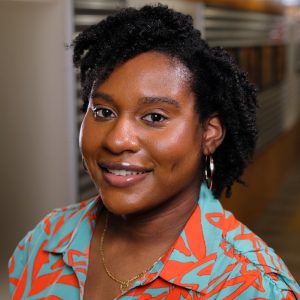Introducing Kelsey Desir, Our 2024-25 Public Scholarship Fellow
November 20, 2024
Doctoral student Kelsey Desir is the Anne Firor Scott Public Scholarship Fellow for 2024-25. She is currently a Ph.D. candidate in English. We asked her to introduce herself.
Tell us a little about your background and your path to Duke.

Photo credit Eric Barstow
I’m from Philadelphia; I did my undergrad there at the University of Pennsylvania and coming to Duke was the first time I left home. I was an English major, and I thought law school would be the next logical step after college. However, an instructor of mine who was a grad student at the time asked me if I considered going into academia. With her encouragement and support, I applied for Penn’s Mellon Mays Undergraduate Fellowship Program, which provided invaluable mentorship and resources as I prepared for and applied to graduate programs. Next thing you know, I was here!
***
What is your research about?
My research is centered on how Black women interrogate their relationship with health and medical institutions through literature and visual art. I particularly examine late 20th-century to contemporary African American and Diasporic poetry, novels, and mixed-media paintings.
***
I understood from a young age that it is important to circulate knowledge throughout your community.
Most people might not expect someone who is pursuing a doctorate in English to be interested in public engagement. How did that interest emerge for you?
I can’t really remember not being interested in public engagement. My love of reading and writing emerged from a public good, the Free Library of Philadelphia (my library card is still active as we speak!). I understood from a young age that it is important to circulate knowledge throughout your community.
My work is primarily housed in the discipline of English, but when I think about my research, I see it first and foremost as Black feminist work. And Black feminism is a world-making project. So, while there are definitely details in my research that maybe only other literary or cultural studies scholars would care about, I am interested in doing work that can also live in the world beyond academia. Early on in grad school, my mother, who’s a nurse, shared something I wrote with a friend of hers who is also a nurse. And when my mother told me that her friend found it insightful, I thought, “Yes, this is what I’m trying to do.”
***
What are your plans for public engagement during your fellowship year? What groups of people are you hoping to bring together?
In the spring, I’m organizing a symposium that will foster an interdisciplinary conversation about Black women’s health. I envision putting poets, nurses, health humanities scholars, and community healers in conversation with one another about expanding our understanding of health by drawing from each other’s strengths.
I want to explore together how expressive culture makes room for Black women’s voices and articulations of what wellness looks like for us.
***
Why do you think it’s important to bring this group of people (poets, health practitioners/healers, scholars of different disciplines) together in conversation?
The importance of bioscience in medicine and health is well established. I hope that by bringing this group of people together, we can make more room for social, emotional, and embodied ways of knowing. When thinking about the fraught history Black women have had with medicine, I want to explore together how expressive culture makes room for Black women’s voices and articulations of what wellness looks like for us.
***
How has your interest in public scholarship affected your dissertation or other research?
I address some of the everyday obstacles that Black women face when seeking healing and reprieve. I aim to make the case that our art has salient information regarding how to better care for us. There’s not a chapter of the dissertation that does not discuss how Black women have to navigate life and the strategies we employ to live well while doing so. These are conversations that people across disciplines and industries are having. Analysis of poetry and critiques of medical capitalism exist side by side in my dissertation. I try to capture these multilayered discussions in my work.
check us out
on social media